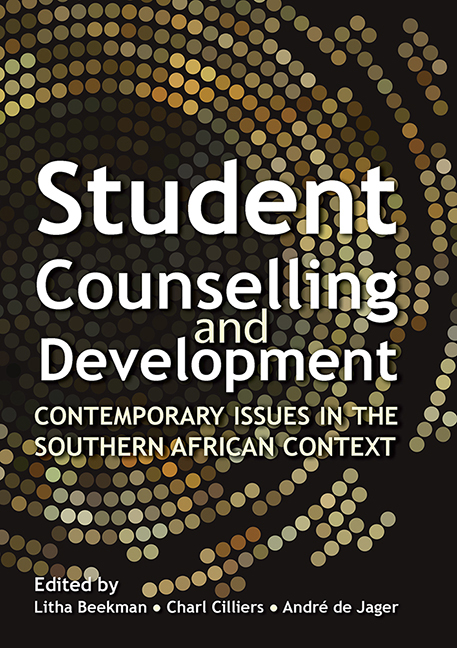Book contents
- Frontmatter
- Contents
- Figures
- Tables
- Preface
- Section 1 Development of Student Counselling and Development in Southern Africa
- Section 2 Theoretical Foundations of Student Counselling and Development in Higher Education
- Section 3 Services and Programmes Provided by Student Counselling and Development Units
- Section 4 Student Counselling and Development For Special Groups
- Section 5 Quality Assurance and Ethical and Professional Issues
- Contributors
- Index
Section 2 - Theoretical Foundations of Student Counselling and Development in Higher Education
Published online by Cambridge University Press: 22 February 2020
- Frontmatter
- Contents
- Figures
- Tables
- Preface
- Section 1 Development of Student Counselling and Development in Southern Africa
- Section 2 Theoretical Foundations of Student Counselling and Development in Higher Education
- Section 3 Services and Programmes Provided by Student Counselling and Development Units
- Section 4 Student Counselling and Development For Special Groups
- Section 5 Quality Assurance and Ethical and Professional Issues
- Contributors
- Index
Summary
What is badly defined is likely to be badly conceptualised and badly practised.
What is your theoretical framework? What is your conceptual framework? These questions are likely to cause a confused expression on many student counsellors’, practitioners’, academics’ and intern students’ faces.
All student counsellors have ideas and preconceived notions about Student Counselling and Development (SCD), higher education (HE) and students, no matter how general in nature these might be. These fundamental beliefs affect how they view and how they practise student counselling. This means that student counsellors are always being guided by a theoretical framework, although they might not be aware of it. Not knowing your theoretical framework can be a problem because it guides your practice — meaning the way you approach SCD and the way you conduct assessments and interventions and plan programmes. Not knowing your theoretical framework means that you do not notice concepts and aspects that do not fit into your existing framework. Student counsellors can rectify this problem by thinking deliberately about their notions — meaning their implicit framework — and making them explicit, as suggested by Borgatti (1999).
In literal terms a framework refers to the “main supporting parts”, for example of a building, or in the case of theory or research, it is defined as a “set of facts and ideas from which more complicated ideas are developed, or on which decisions are based” (Longman, 2001, p. 560). A framework is simply the structure of how something (an idea or a concept) is put together.
A theory is a discussion of related and coherent concepts or statements based on research. We use theory to explain the various components of SCD and to make generalisations about observations during our practice as student counsellors. We form our theoretical framework by selecting those theories that can best explain the relationships among the components or variables of SCD services and practice. Theories provide answers to the “what” and “why” of practice. To develop a theoretical framework the two basic questions to be answered are: What constitutes SCD, and how do student counsellors approach their practice?
- Type
- Chapter
- Information
- Student Counselling and DevelopmentContemporary issuesin the Southern African Context, pp. 63 - 66Publisher: University of South AfricaPrint publication year: 2012



